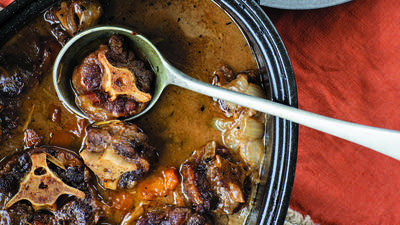Q: What is the advantage of using extra-virgin olive oil for cooking? I've heard that heat generally "cooks out" the flavor and fragrance of the oil.
LYNNE: I refer to (and my recipes call for) extra-virgin olive oil because it is the only form of olive oil with less than 1 percent acidity and produced with no heat or solvents, which can alter the nutritional value of the oil and its natural flavors.
Virgin, pure, pomace, etc. all have varying experiences with heat and solvents which can alter taste and nutrients. For a detailed description of the differences, see the ingredients section of my book, The Splendid Table (Morrow, 1992).
While heat does mute some of the olive oil's character, the notion that you shouldn't use extra-virgin oil in cooking has been put forward by misinformed food writers. The better the oil tastes, the better your food will taste. The choice of using extra-virgin oil or not is more a matter of economics. It is expensive. Most restaurants, for instance, can't afford it.
For my money, I use a good-tasting, (this must be stressed—full, rich and fruity) modestly priced, extra-virgin oil in my cooking—for instance, oils from Turkey, Greece, Spain, or Italy-then I use a distinctive-tasting extra-virgin oil for flavoring finished dishes. The key is to taste the oil before using it in your cooking. Sip it straight from a spoon, not on bread, which kills off most of the nuances.
Finishing is a new idea for we American cooks. In the Mediterranean, it's common practice to season a dish with a drizzle of good-tasting oil—only 1/2 teaspoon or so per serving. Try it with vegetables, soups, grains, pasta, fish, and meat. It can work miracles.
Before you go...
Each week, The Splendid Table brings you stories that expand your world view, inspire you to try something new and show how food brings us together. We rely on you to do this. And, when you donate, you'll become a member of The Splendid Table Co-op. It's a community of like-minded individuals who love good food, good conversation and kitchen companionship. Splendid Table Co-op members will get exclusive content each month and have special opportunities for connecting with The Splendid Table team.
Donate today for as little as $5.00 a month. Your gift only takes a few minutes and has a lasting impact on The Splendid Table and you'll be welcomed into The Splendid Table Co-op.



